|
|
|
Sort Order |
|
|
|
Items / Page
|
|
|
|
|
|
|
| Srl | Item |
| 1 |
ID:
078685
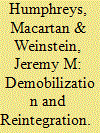

|
|
|
|
|
| Publication |
2007.
|
| Summary/Abstract |
Since 1989, international efforts to end protracted conflicts have included sustained investments in the disarmament, demobilization, and reintegration (DDR) of combatants. Yet while policy analysts have debated the factors that contribute to successful DDR programs and scholars have reasoned about the macro conditions that facilitate successful peace building, little is known about the factors that account for successful reintegration at the micro level. Using a new dataset of ex-combatants in Sierra Leone, this article analyzes the individual-level determinants of demobilization and reintegration. Past participation in an abusive military faction is the strongest predictor of difficulty in achieving social reintegration. On economic and political reintegration, we find that wealthier and more educated combatants face greater difficulties. Ideologues, men, and younger fighters are the most likely to retain strong ties to their factions. Most important, we find little evidence at the micro level that internationally funded programs facilitate demobilization and reintegration
|
|
|
|
|
|
|
|
|
|
|
|
|
|
|
|
| 2 |
ID:
186189
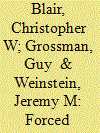

|
|
|
|
|
| Summary/Abstract |
Little theoretical or empirical work examines migration policy in the developing world. We develop and test a theory that distinguishes the drivers of policy reform and factors influencing the direction of reform. We introduce an original data set of de jure asylum and refugee policies covering more than ninety developing countries that are presently excluded from existing indices of migration policy. Examining descriptive trends in the data, we find that unlike in the global North, forced displacement policies in the global South have become more liberal over time. Empirically, we test the determinants of asylum policymaking, bolstering our quantitative results with qualitative evidence from interviews in Uganda. A number of key findings emerge. Intense, proximate civil wars are the primary impetus for asylum policy change in the global South. Liberalizing changes are made by regimes led by political elites whose ethnic kin confront discrimination or violence in neighboring countries. There is no generalizable evidence that developing countries liberalize asylum policy in exchange for economic assistance from Western actors. Distinct frameworks are needed to understand migration policymaking in developing versus developed countries.
|
|
|
|
|
|
|
|
|
|
|
|
|
|
|
|
| 3 |
ID:
074856
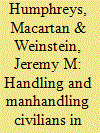

|
|
|
|
|
| Publication |
2006.
|
| Summary/Abstract |
The toll of civil conflict is largely borne by civilian populations, as warring factions target non-combatants through campaigns of violence. But significant variation exists in the extent to which warring groups abuse the civilian population: across conflicts, across groups, and within countries geographically and over time. Using a new dataset on fighting groups in Sierra Leone, this article analyzes the determinants of the tactics, strategies, and behaviors that warring factions employ in their relationships with noncombatants. We first describe a simple logic of extraction which we use to generate hypotheses about variation in levels of abuse across fighting units. We then show that the most important determinants of civilian abuse are internal to the structure of the faction. High levels of abuse are exhibited by warring factions that are unable to police the behavior of their members because they are more ethnically fragmented, rely on material incentives to recruit participants, and lack mechanisms for punishing indiscipline. Explanations that emphasize the importance of local community ties and contestation do not find strong support in the data.
|
|
|
|
|
|
|
|
|
|
|
|
|
|
|
|
| 4 |
ID:
140805


|
|
|
|
|
| Summary/Abstract |
Social cooperation is critical to a wide variety of political and economic outcomes. For this reason, international donors have embraced interventions designed to strengthen the ability of communities to solve collective-action problems, especially in post-conflict settings. We exploit the random assignment of a development program in Liberia to assess the effects of such interventions. Using a matching funds experiment we find evidence that these interventions can alter cooperation capacity. However, we observe effects only in communities in which, by design, both men and women faced the collective action challenge. Focusing on mechanisms, we find evidence that program effects worked through improvements in mobilization capacity that may have enhanced communities’ ability to coordinate to solve mixed gender problems. These gains did not operate in areas where only women took part in the matching funds experiment, possibly because they could rely on traditional institutions unaffected by the external intervention. The combined evidence suggests that the impact of donor interventions designed to enhance cooperation can depend critically on the kinds of social dilemmas that communities face, and the flexibility they have in determining who should solve them.
|
|
|
|
|
|
|
|
|
|
|
|
|
|
|
|
| 5 |
ID:
075925
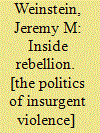

|
|
|
|
|
| Publication |
Cambridge, Cambridge University Press, 2007.
|
| Description |
xx, 402p.
|
| Standard Number |
0521677971
|
|
|
|
|
|
|
|
|
|
|
|
Copies: C:1/I:1,R:0,Q:0
Circulation
| Accession# | Call# | Current Location | Status | Policy | Location | IssuedTo | DueOn |
| 052138 | 322.42/WEI 052138 | Main | Issued | General | | RA34 | 01-May-2024 |
|
|
|
|
| 6 |
ID:
186190
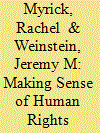

|
|
|
|
|
| Summary/Abstract |
Scholarship on human rights diplomacy (HRD)—efforts by government officials to engage publicly and privately with their foreign counterparts—often focuses on actions taken to “name and shame” target countries because private diplomatic activities are unobservable. To understand how HRD works in practice, we explore a campaign coordinated by the US government to free twenty female political prisoners. We compare release rates of the featured women to two comparable groups: a longer list of women considered by the State Department for the campaign; and other women imprisoned simultaneously in countries targeted by the campaign. Both approaches suggest that the campaign was highly effective. We consider two possible mechanisms through which expressive public HRD works: by imposing reputational costs and by mobilizing foreign actors. However, in-depth interviews with US officials and an analysis of media coverage find little evidence of these mechanisms. Instead, we argue that public pressure resolved deadlock within the foreign policy bureaucracy, enabling private diplomacy and specific inducements to secure the release of political prisoners. Entrepreneurial bureaucrats leveraged the spotlight on human rights abuses to overcome competing equities that prevent government-led coercive diplomacy on these issues. Our research highlights the importance of understanding the intersection of public and private diplomacy before drawing inferences about the effectiveness of HRD.
|
|
|
|
|
|
|
|
|
|
|
|
|
|
|
|
| 7 |
ID:
059036


|
|
|
|
|
| Publication |
Jan-Feb 2005.
|
| Summary/Abstract |
Porter, and Jeremy Weinstein
The turmoil caused by weak and failing states gravely threatens U.S. security, yet Washington is doing little to respond. The United States needs a new, comprehensive development strategy combining crisis prevention, rapid response, centralized decision-making, and international cooperation.
|
|
|
|
|
|
|
|
|
|
|
|
|
|
|
|
| 8 |
ID:
065630
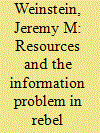

|
|
|
| 9 |
ID:
159263


|
|
|
|
|
|
|
|